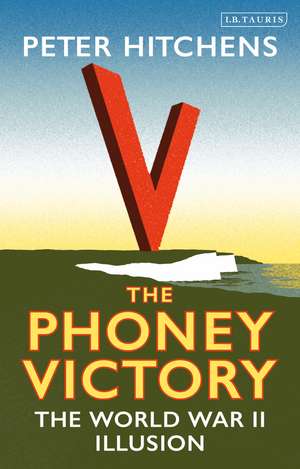The Phoney Victory: The World War II Illusion
Autor Peter Hitchensen Limba Engleză Hardback – 5 sep 2018
| Toate formatele și edițiile | Preț | Express |
|---|---|---|
| Paperback (1) | 68.84 lei 3-5 săpt. | +56.13 lei 7-13 zile |
| Bloomsbury Publishing – 8 iul 2020 | 68.84 lei 3-5 săpt. | +56.13 lei 7-13 zile |
| Hardback (1) | 174.18 lei 6-8 săpt. | |
| Bloomsbury Publishing – 5 sep 2018 | 174.18 lei 6-8 săpt. |
Preț: 174.18 lei
Preț vechi: 290.29 lei
-40% Nou
Puncte Express: 261
Preț estimativ în valută:
33.33€ • 34.80$ • 27.58£
33.33€ • 34.80$ • 27.58£
Carte tipărită la comandă
Livrare economică 05-19 aprilie
Preluare comenzi: 021 569.72.76
Specificații
ISBN-13: 9781788313292
ISBN-10: 1788313291
Pagini: 288
Dimensiuni: 138 x 216 x 27 mm
Greutate: 0.45 kg
Editura: Bloomsbury Publishing
Colecția I.B.Tauris
Locul publicării:London, United Kingdom
ISBN-10: 1788313291
Pagini: 288
Dimensiuni: 138 x 216 x 27 mm
Greutate: 0.45 kg
Editura: Bloomsbury Publishing
Colecția I.B.Tauris
Locul publicării:London, United Kingdom
Caracteristici
Challenges commonly-held assumptions on World War II
Notă biografică
Peter Hitchens is a journalist and commentator. He has a weekly column in the Mail on Sunday and is the author of several books, including The Abolition of Britain; The Cameron Delusion; The Rage Against God and The War We Never Fought.
Recenzii
Hitchens is right to challenge the very idea of a "good war". The Second World War was a global cataclysm that killed about 60 million people and left millions more displaced and traumatized. He is also correct that public debate about international security would be vastly improved if politicians and pundits stopped appealing to the "lessons" of Hitler and appeasement to justify military action.
Hitchens devotes much of his indictment to the war at sea, arguing that the Navy had been starved of resources between the wars and was ill-equipped to fight the all-important Battle of the Atlantic against the Nazi U-boat fleet. He regales the reader with touching stories from his days at boarding school, when he and his friends built plastic models of warships.
Hitchens devotes much of his indictment to the war at sea, arguing that the Navy had been starved of resources between the wars and was ill-equipped to fight the all-important Battle of the Atlantic against the Nazi U-boat fleet. He regales the reader with touching stories from his days at boarding school, when he and his friends built plastic models of warships.
Cuprins
AcknowledgementsTimelineIntroduction1. The British Guarantee to Poland of March 19392. Plucky Little Poland3. Appeasement and Pacifism from Fulham to Bridgwater, or 'The Left Has Its Cake and Eats It'4. The War We Couldn't Afford5. America First6. The Invasion that Never Was7. In Peril on the Sea8. Gomorrah9. Orderly and HumaneConclusionNotesSelect BibliographyIndex



